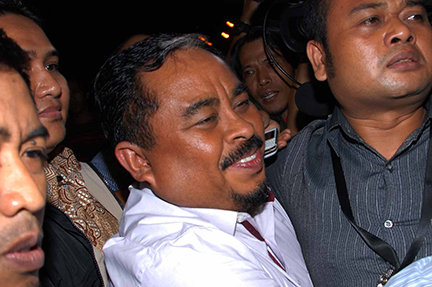
by Kevin W. Fogg
Late last month, the head of Indonesia’s most prominent Islamic political party, the Prosperous Justice Party or PKS (Partai Keadilan Sejahtera), was arrested in connection to a corruption scandal over importation licenses. His arrest made it the first time that the chairperson of any party has been arrested for corruption, even though the chairmen of some secular parties have also been getting some heat. The arrest of Luthfi Hasan Ishaaq elicited shock from across the Indonesian political spectrum, and even accusations by PKS members of a vast Zionist conspiracy to bring down the Islamic party, among other allegations of selective investigation of corruption.
Why is the arrest of Luthfi of the PKS more than your average corruption scandal? Well, it has plenty of juicy elements, like how Luthfi’s aide was arrested completely unclothed while in the company of a 19-year-old young college woman, who is not one of his alleged five wives but was also completely unclothed.
More seriously, though, the case is important is it gives the Corruption Eradication Commission a reason to investigate PKS more broadly, which could turn up more corruption. Many people are speculating that the PKS-aligned Minister of Agriculture (whose ministry oversees the import licenses) could go down over this scandal – the second time a minister would fall because of corruption in the last few months.
Equally important is the way that this scandal undermines the very existence of PKS, which was until recent years the only truly platform-based party left in Indonesian politics. PKS rose from electoral failure in 1999 to significant influence by 2004 through its emphasis on cadre training and clean government—exactly the principles it has been shown not to have in this scandal.
This has also kicked off a season of speculation about the poor odds facing Islamic parties in next year’s national elections. Several have suggested a coalition like the one they had in 1998, and one of the smaller parties that did not pass electoral muster has now merged with PPP, the second-largest Islamic party in parliament. Still, critics (including those among the Islamic parties themselves) say that even this could not guarantee Islamic parties victory.
Finally, as corruption has now hit all the major parties (PKS was the last to be relatively corruption-free), this has prompted some broad speculation about the future of the Indonesian political system. Veteran Indonesian journalist Endy Bayuni is arguing that it may be time to think about trying and punishing parties, not just individuals, for the corruption they participate in. I think his argument overlooks the money questions in parties’ candidate selection, where individuals can pay ludicrous sums to get on a party’s ticket. (One major case in Maluku province had a possible candidate pay the party Rp. 1 billion, approximately $100,000 US, only to be dumped from the ballot at the last minute.) Another big question is whether this will finally convince the Indonesian public that clean Islamic parties are an imagined ideal rather than a tangible reality—certainly no Islamic party is looking too strong for the upcoming elections.
Kevin W. Fogg is an Al-Bukhari Fellow in the History of Islam in Southeast Asia, Centre for Islamic Studies, Islamic Centre Lecturer, Faculty of History, University of Oxford